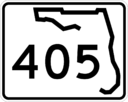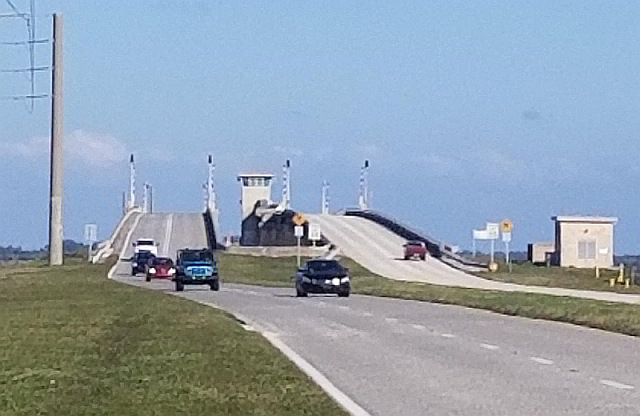IRLNews:2021-03-01/NASA Causeway Bridges and Beyond: Difference between revisions
mNo edit summary |
mNo edit summary |
||
| Line 9: | Line 9: | ||
|Water_Body=Estuary | |Water_Body=Estuary | ||
|Type=Opinion-Editorial | |Type=Opinion-Editorial | ||
|Sub_Title=What does KSC's | |Sub_Title=What does KSC's future hold for the Indian River Lagoon? | ||
|Text_Body=The 1960's NASA causeways across the Indian and Banana River lagoons were constructed during a furious Cold War space race that completely disregarded the environment in the name of national security. | |Text_Body=The 1960's NASA causeways across the Indian and Banana River lagoons were constructed during a furious Cold War space race that completely disregarded the environment in the name of national security. | ||
| Line 37: | Line 37: | ||
The 2017 KSC Master Plan displays a map showing over 8,000 acres of "developable" property available for commercial development, including areas deep in the heart of a National Wildlife Refuge and a National Seashore.<ref>[https://masterplan.ksc.nasa.gov/-/media/Master%20Plan/PDF-Word-Doc/NASA-KSC-Executive-Summary-2017.ashx 2017 KSC Master Plan (PDF 10pp 16.12MB)], retrieved 2021-02-28.</ref> | The 2017 KSC Master Plan displays a map showing over 8,000 acres of "developable" property available for commercial development, including areas deep in the heart of a National Wildlife Refuge and a National Seashore.<ref>[https://masterplan.ksc.nasa.gov/-/media/Master%20Plan/PDF-Word-Doc/NASA-KSC-Executive-Summary-2017.ashx 2017 KSC Master Plan (PDF 10pp 16.12MB)], retrieved 2021-02-28.</ref> | ||
NASA is the reason these wilderness areas exist in the first place. KSC | NASA is the reason these wilderness areas exist in the first place. KSC set aside a large land parcel as a buffer zone, and they gave it to the to the National Park Service (NPS), and Fish and Wildlife Service (FWS), to manage as Canaveral National Seashore (CANA) and Merritt Island National Wildlife Refuge (MINWR). | ||
Now, NASA is offering up the land it set aside as public wilderness areas for commercial development. [https://www.fws.gov/refuge/Merritt_Island/Proposed_Shiloh_Launch_Complex.html.aspx Fish and Wildlife Service: Proposed Shiloh Launch Complex in Merritt Island National Wildlife Refuge] | Now, NASA is offering up the land it set aside as public wilderness areas for commercial development. [https://www.fws.gov/refuge/Merritt_Island/Proposed_Shiloh_Launch_Complex.html.aspx Fish and Wildlife Service: Proposed Shiloh Launch Complex in Merritt Island National Wildlife Refuge] | ||
For decades, we have trusted NASA to be | For decades, we have trusted NASA to be good environmental stewards for the largest stretch of undeveloped land on Florida’s East Coast, yet it appears that the MINWR and CANA wilderness areas are in grave jeopardy. | ||
We stand to lose a National Wildlife Refuge, a National Seashore, and numerous archeology sites if NASA's plans for Kennedy Space Center are successful. | |||
==A National Space Center Becomes A State Run Space Port== | ==A National Space Center Becomes A State Run Space Port== | ||
The 2017 KSC Master Plan outlines NASA’s intention to transition day to day operation of the launch center to | The 2017 KSC Master Plan outlines NASA’s intention to transition day to day operation of the launch center to Space Florida, in what is to become Cape Canaveral Spaceport. | ||
Cape Canaveral Spaceport's 2017 Master Plan<ref>[https://www.spaceflorida.gov/wp-content/uploads/2018/12/sf-bod-approved-ccs-master-plan-02-01-17.pdf Cape Canaveral Spaceport's 2017 Master Plan], retrieved 2021-02-28.</ref> makes no mention of the environment | Cape Canaveral Spaceport's 2017 Master Plan<ref>[https://www.spaceflorida.gov/wp-content/uploads/2018/12/sf-bod-approved-ccs-master-plan-02-01-17.pdf Cape Canaveral Spaceport's 2017 Master Plan], retrieved 2021-02-28.</ref> makes no mention of the environment; their mission is to provide public launch facilities for the commercial space industry's tourists and freight. | ||
In the future, Space Florida's spaceport, and it’s many commercial tenants, will be individually responsible for their parcel of Kennedy Space Center's environment. | In the future, Space Florida's spaceport, and it’s many commercial tenants, will be individually responsible for their parcel of Kennedy Space Center's environment. | ||
Revision as of 10:19, March 10, 2021
It wasn’t until 1970 that the National Environmental Policy Act (NEPA) was passed to regulate the environmental impact of Federal Agencies. NEPA requires federal organizations to adhere to a defined environmental review of their activities.[1]
There are 4 levels to a NEPA review, the first is Categorical Exclusion (CATEX), which allows a federal agency to list any activities that should be excluded from environmental review.[2] NASA has Categorically Excluded most all of its activities in the name of national security.[3]
SR405 Indian River Bridge Rebuild

NASA is the Indian River Lagoon National Estuary's largest shareholder, and their mission statement includes promises of environmental stewardship, yet they continue to perpetuate outdated causeways that have constricted water flow in the Indian River and Banana River lagoon for decades.
NASA's project to rebuild the 1964 Indian River Bridge avoided a NEPA environmental review when NASA Categorically Excluded the project, and then named the Federal Highway Administration (FHWA) as a co-agency on the project. As a federal co-agency the FHWA inherited the bridge project’s Categorical Exclusions from NASA.
In 2017, NASA signed over ownership of the SR405 Indian River Causeway to the Florida Department of Transportation (FDOT)[4] . A convenient 2016 FHWA - FDOT Agreement allowed FHWA to transfer the rebuild project's Categorical Exclusions to FDOT.
And so, FDOT now owns the SR405 Indian River Causeway, and the state's rebuild project is exempt from environmental review.
A 57 year old earthen berm causeway; hurriedly constructed during the Cold War; built years before environmental regulations were enacted; will continue to constrict over 80% of the Indian River lagoon at Addison Point.[5]
Unfortunately, the Indian River Bridge project's lack of environmental review is just an indication of what is ahead for the national estuary.
And Beyond

NASA is quickly working to divest it’s non-mission critical facilities and vacant land at Kennedy Space Center (KSC).
The 2017 KSC Master Plan displays a map showing over 8,000 acres of "developable" property available for commercial development, including areas deep in the heart of a National Wildlife Refuge and a National Seashore.[6]
NASA is the reason these wilderness areas exist in the first place. KSC set aside a large land parcel as a buffer zone, and they gave it to the to the National Park Service (NPS), and Fish and Wildlife Service (FWS), to manage as Canaveral National Seashore (CANA) and Merritt Island National Wildlife Refuge (MINWR).
Now, NASA is offering up the land it set aside as public wilderness areas for commercial development. Fish and Wildlife Service: Proposed Shiloh Launch Complex in Merritt Island National Wildlife Refuge
For decades, we have trusted NASA to be good environmental stewards for the largest stretch of undeveloped land on Florida’s East Coast, yet it appears that the MINWR and CANA wilderness areas are in grave jeopardy.
We stand to lose a National Wildlife Refuge, a National Seashore, and numerous archeology sites if NASA's plans for Kennedy Space Center are successful.
A National Space Center Becomes A State Run Space Port
The 2017 KSC Master Plan outlines NASA’s intention to transition day to day operation of the launch center to Space Florida, in what is to become Cape Canaveral Spaceport.
Cape Canaveral Spaceport's 2017 Master Plan[7] makes no mention of the environment; their mission is to provide public launch facilities for the commercial space industry's tourists and freight.
In the future, Space Florida's spaceport, and it’s many commercial tenants, will be individually responsible for their parcel of Kennedy Space Center's environment.
- Should a 2021 state run commercial spaceport inherit the same environmental exclusions that NASA's KSC received during the 1960's Cold War?
- Should our National wilderness areas be parceled out for commercial space development?
- Can commercial space organizations be good environmental stewards for our National Wildlife Refuge, National Seashore, and the lagoons of the Indian River Lagoon National Estuary?
To be continued...
Video
"...capably service both government and commercial users and their ambitious new missions while inspiring engaging and nurturing our future workforce and the space explorers of tomorrow and all the while protecting a beautiful patch of our home planet as stirring as the heavens we explore."
Bob Cabana, Director, Kennedy Space Center
Kennedy Space Center Master Plan
See Also
Web Links
- Florida Today - Removing Earthen berm causeways would improve Banana River water quality
- FWS:MINWR - SpaceFlorida's Proposed Shiloh Launch Complex in Merritt Island National Wildlife Refuge
- Blue Origin to fill wetlands for Rocket Test Site
- Environmental organizations spotlight inadequate oversight by FAA of SpaceX’s Boca Chica testing facility, call for an EIS
- Kennedy Space Center Master Plan
- Space Florida
- Cape Canaveral Spaceport
Documents
- 2017 KSC Master Plan (PDF 10pp 16.12MB)
- 2012-2031 KSC Future Development Concept (PDF 44pp 3.78MB)
- 2017 Cape Canaveral Spaceport Master Plan (PDF 68pp 20.86MB)
- NASA Causeway Bridge Replacement Project Development and Final Design FDOT - Volkert 2020-10-14 (PDF 29pp 9.34MB)
- GSA KSC Indian River Bridge Targeted Asset Review (PDF 18pp 685KB)
- 2018-12-06 NASA Causeway Bridge Project Development and Environment (PD&E) Study Flyer (PDF 2pp 1.78MB)
- 2019-10-17 FDOT NASA Causeway Bridge Public Meeting Notice (PDF 2pp 108KB)
- USCG NASA Indian River Bridge Public Notice and Bridge Plans (PDF 19pp 12.5MB
- MINWR The Shiloh Area and Proposed Launch Site (PDF 1p 197KB)
References
- ↑ NASA and the National Environmental Policy Act, retrieved 2021-02-28
- ↑ KSC NEPA, retrieved 2021-02-28
- ↑ NASA Categorical Exclusions, retrieved 2021-02-28
- ↑ KSC Targeted Asset Review 2017 -07-14 (PDF 18pp 685KB), retrieved on 2021-02-28
- ↑ Info:NASA Causeway Indian River
- ↑ 2017 KSC Master Plan (PDF 10pp 16.12MB), retrieved 2021-02-28.
- ↑ Cape Canaveral Spaceport's 2017 Master Plan, retrieved 2021-02-28.

